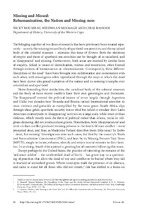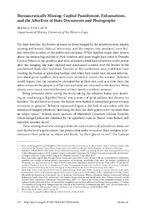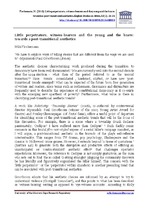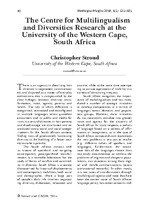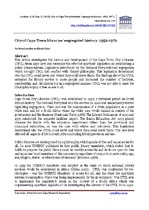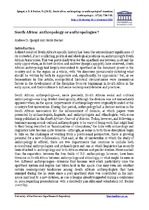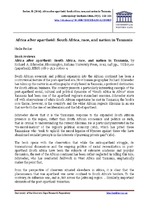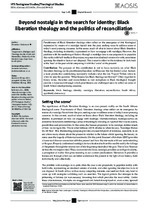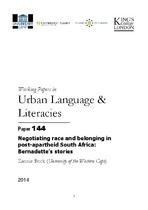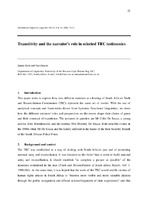Search
Now showing items 1-10 of 27
Missing and missed: Rehumanisation, the nation and missing-ness
(University of the Western Cape, 2018)
The bringing together of two lines of research that have previously been treated separately – namely the missing/missed body of apartheid-era atrocities and the racialised body of the colonial museum – animates this issue ...
Bureaucratically missing: Capital punishment, exhumations, and the afterlives of state documents and photographs
(University of the Western Cape, 2018)
For their families, the bodies of many of those hanged by the apartheid state remain missing and missed. Judicial executions, and the corpses they produced, were hidden from the scrutiny of the public and the press. While ...
Little perpetrators, witness-bearers and the young and the brave: towards a post-transitional aesthetics
(Taylor & Francis, 2010)
The aesthetic choices characterizing work produced during the transition to democracy have
been well documented. We are currently well into the second decade after the 1994 election -
what then of the period referred to ...
The Centre for Multilingualism and Diversities Research at the University of the Western Cape, South Africa
(University of the Western Cape, 2014)
There is an urgency in theorising how
diversity is negotiated, communicated,
and disputed as a matter of everyday
ordinariness that is compounded by the
clear linkages between diversity, transformation,
voice, agency, ...
City of Cape Town libraries' segregated history: 1952-1972
(University of KwaZulu-Natal, 2015)
This article investigates the history and development of the Cape Town City Libraries (CTCL) from 1952-1972 and examines the effect of apartheid legislation on establishing a public library system. Legislation introduced ...
South Africa: anthropology or anthropologies?
(American Anthropological Association, 2015)
A direct result of South Africa’s specific history has been the extraordinary significance of its contested, if not conflicting, political and ideological positions on anthropology’s South African trajectories. This was ...
Africa after apartheid: South Africa, race, and nation in Tanzania
(Routledge, 2016)
South African economic and political expansion into the African continent has been a controversial
feature of the post-apartheid era. Now human geographer Richard Schroeder has taken up the matter
in an ethnographic study ...
Beyond nostalgia in the search for identity: Black liberation theology and the politics of reconciliation
(AOSIS, 2021)
Practitioners of Black liberation theology often reflect on the emergence of this theological
expression by means of a nostalgic launch into the past, seeking ways to address some of
today’s most pressing concerns. In ...
Negotiating race and belonging in a post-apartheid South Africa: Bernadette’s stories
(Kings College, Univ. of London, 2014)
Although apartheid officially ended in 1994, race as a primary marker of identity has
continued to permeate many aspects of private and public life in a post-apartheid
South Africa. This paper explores how race is ...
Transitivity and the narrator's role in selected TRC testimonies
(Stellenbosch University, 2006)
This paper seeks to explore how two different narrators at a hearing of South Africa's Truth and Reconciliation Commission (TRC) represent the same set of events. With the use of analytical concepts and frameworks drawn ...

